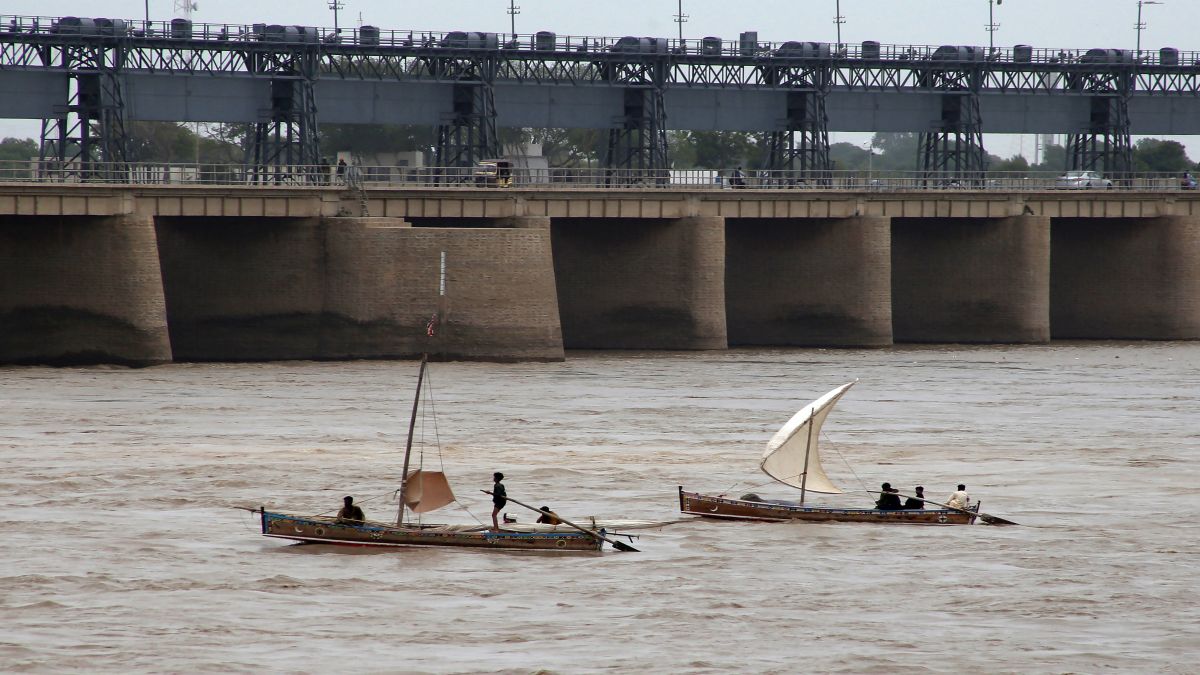In the aftermath of the April 22 Pahalgam attack, India took stern steps announcing that it was pausing the Indus Waters Treaty with Pakistan, with Prime Minister Narendra Modi stating, “Now, India’s water will flow for India’s benefit, it will be conserved for India’s benefit, and it will be used for India’s progress.”
However, this move of putting the years-old treaty on hold has enraged Pakistan — with its prime minister now issuing threats to New Delhi, saying the “enemy” would not be allowed to snatch “even one drop” of water belonging to his country.
His remarks come after Pakistan’s army chief Field Marshal Asim Munir and its former foreign minister Bilawal Bhutto issued similar threats. But should these threats worry India?
What did Sharif say on IWT?
Any attempt to block water flows into Pakistan would violate the Indus Waters Treaty (IWT) and provoke a “decisive response”, Pakistan Prime Minister Shehbaz Sharif said on Tuesday, issuing a stern warning to India yet again.
Addressing an event in Islamabad, Sharif was quoted by Geo News as saying, “The enemy cannot snatch even a single drop of water from Pakistan. If you attempt such a move, we will teach you a lesson you will never forget.” He described water as Pakistan’s “lifeline” and vowed no compromise on the nation’s rights under international agreements.
What about Bhutto and Asim Munir?
Sharif’s remarks come after former foreign minister Bilawal Bhutto-Zardari made similar comments, terming the Indus Waters Treaty’s suspension an attack on the Indus Valley Civilisation and said Pakistan would not back down if India forced it into war.
While speaking at a function on Monday, the Pakistani leader say the country is “strong enough for war to get back all six rivers,” vowing that Pakistan “will never bow down”.
According to a report by Express Tribune, Bhutto said that the Indus is the singular major water source for the entire country and that the Indus valley civilisation has remained connected with the river for aeons. “We have fought wars in the past, but the Indus was never attacked, and no one even thought of building dams or canals on the river.”
Even Pakistan’s Field Marshal Asim Munir issued threats against India over the Indus Waters Treaty. From US soil, the war-mongering general said that Islamabad would destroy any dam if it cut off water flow to Pakistan. “We will wait for India to build a dam, and when it does so, phir 10 missile sey faarigh kar dengey [we will destroy it with 10 missiles],” he was quoted as saying by The Print.
Do these threats hold any water?
However, it seems that these remarks are part of just empty rhetoric. The treaty has a redressal system in which disputes are first taken up at the level of the Indus Commissioners of India and Pakistan, then escalated to the World Bank-appointed Neutral Expert, and finally to the International Court of Arbitration (CoA) in The Hague.
The World Bank itself has no jurisdiction in the matter with President Ajay Banga stating that the said that the agency has no role to play beyond a facilitator in the Indus Waters Treaty signed between India and Pakistan in 1960 for sharing of waters of Indus, Jhelum, and Chenab.
“We have no role to play beyond a facilitator. There’s a lot of speculation in the media about how the World Bank will step in and fix the problem, but it’s all bunk. The World Bank’s role is merely as a facilitator,” World Bank President, Ajay Banga, was quoted as saying earlier.
Moreover, India has also rejected the Permanent Court of Arbitration (PCA) at The Hague in this matter. New Delhi has maintained that it does not recognise this body and had earlier insisted that a neutral expert should handle the matter. However, the PCA proceeded, resulting in India boycotting the proceedings, terming them as “illegal”.
In fact, on August 11, the PCA ruled that India must adhere to the Indus Waters Treaty in the design of new hydro-electric power stations on rivers that flow west to Pakistan endorsing Islamabad’s position. In its ruling, it noted that it “does not permit India to generate hydro-electric power on the Western Rivers based on what might be the ideal or best practices approach for engineering” of these projects.
However, India has rejected this, maintaining that the arbitration process was unilaterally initiated by Pakistan, violating the treaty’s dispute resolution mechanism and undermining bilateral dialogue.
Why is the Indus Waters so important to Pakistan?
But why all of this hoopla over pact signed way back in 1960? Pakistan gets around 80 per cent of the Indus basin water, making it one of the largest irrigation systems in the world. About 80 per cent of Pakistan’s farmland or nearly 16 million hectares, depends on this water, and 90 per cent of it goes into irrigation.
Now, if the water was to dry up here as a result of India holding back water in its reservoirs, Pakistan’s farmers might struggle to sow key crops like cotton and paddy on time. This would eventually hurt the country’s economy . There’s also the matter of power; the lack of water could squeeze power generation, hit factory production and drive electricity prices even higher. And that’s bad news because Pakistan’s power sector is already drowning in $9 billion of circular debt.
Only time will tell if Pakistan resorts to military solutions on the Indus Waters Treaty. For now, it’s a wait and watch game?
With inputs from agencies
)